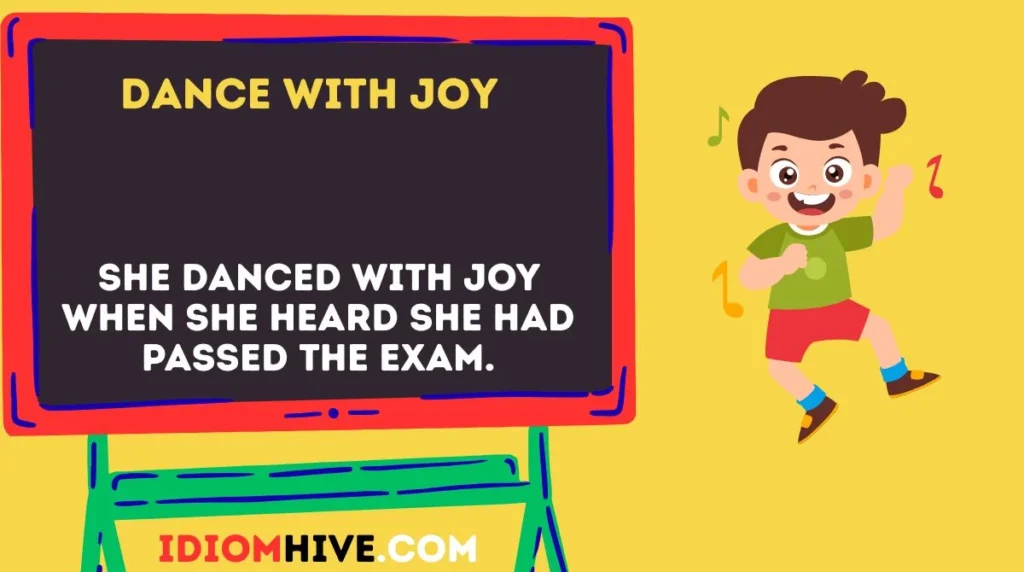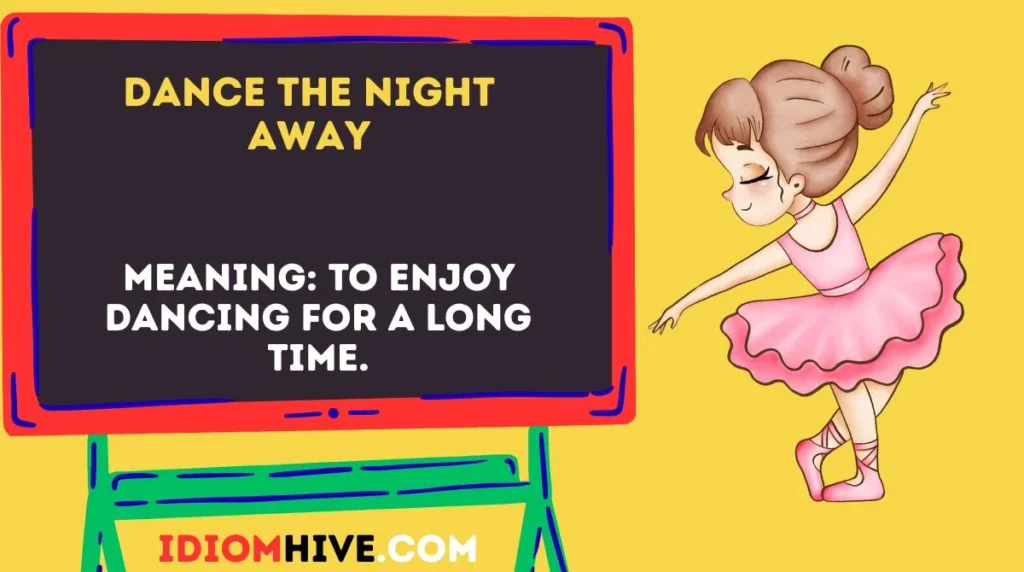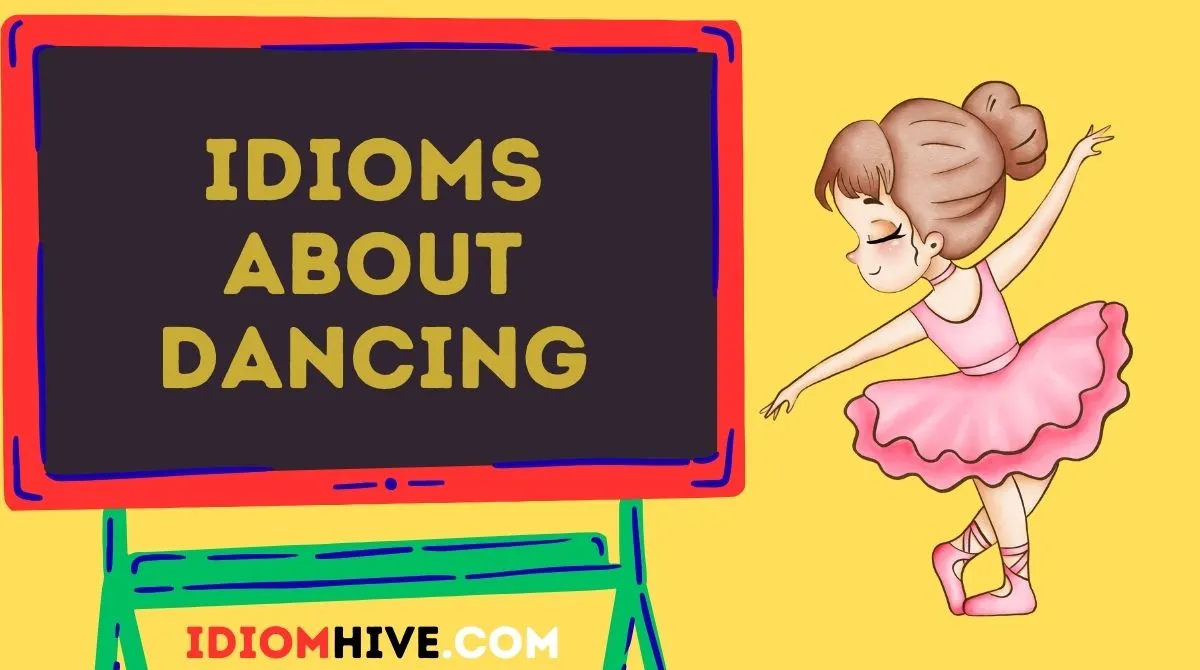Idioms are colorful expressions that bring life to everyday language. Instead of using plain words, idioms help us add rhythm, creativity, and cultural meaning to conversations. When it comes to dancing idioms, the imagery is especially powerful.
Dance is not only a form of art but also a universal way of expressing joy, freedom, and connection. That is why many idioms about dancing have found their way into English. They capture feelings of happiness, social interactions, relationships, and even struggles.
Learning idioms about dancing makes communication richer, more playful, and often more memorable. Whether you are speaking casually with friends, writing creatively, or giving a lively presentation, dance idioms can help you sound more natural and expressive.
In this guide, we will explore over 44 idioms about dancing, organized by themes, with meanings, examples, and reflections on their use.
Did You Know?
The English phrase “It takes two to tango” comes from a popular Argentine dance that requires perfect coordination between partners. This idiom became so famous that it is often used in politics, law, and even business negotiations!
Idioms About Joy and Celebration
Dance with Joy

Meaning: To be extremely happy.
Example: She danced with joy when she heard she had passed the exam.
Similar Idiom: Jump for joy.
Note: Common in informal daily conversations.
Trip the Light Fantastic
Meaning: To dance gracefully and energetically.
Example: They tripped the light fantastic at the wedding reception.
Similar Idiom: Cut a rug.
Note: Often used in creative writing and literature.
Dance Around in Delight
Meaning: To show excitement by moving or dancing happily.
Example: The children danced around in delight when the ice cream truck arrived.
Similar Idiom: Bounce with joy.
Note: Informal, used mostly in storytelling.
On Cloud Nine and Dancing
Meaning: To feel very happy, as if dancing from joy.
Example: After getting his dream job, he was on cloud nine and dancing.
Similar Idiom: Over the moon.
Note: Informal and expressive in everyday language.
Dance Attendance
Meaning: To pay close and eager attention to someone.
Example: He danced attendance on his boss all day to impress him.
Similar Idiom: At someone’s beck and call.
Note: Slightly formal, often used with a critical tone.
Idioms About Love, Relationships, and Social Life
Lead Someone a Merry Dance
Meaning: To make life difficult or complicated for someone.
Example: She led him a merry dance with her constant demands.
Similar Idiom: Give someone the runaround.
Note: Informal, often used in romantic or personal contexts.
It Takes Two to Tango
Meaning: Both people are responsible for a situation, often a conflict.
Example: Don’t blame just her—it takes two to tango.
Similar Idiom: Both sides of the coin.
Note: Used in everyday conversations and professional discussions.
Dance Around an Issue
Meaning: To avoid talking about something directly.
Example: The politician danced around the question instead of answering it.
Similar Idiom: Beat around the bush.
Note: Common in business and formal speech.
Dance to Someone’s Tune
Meaning: To do what someone else wants.
Example: He always dances to his manager’s tune.
Similar Idiom: Toe the line.
Note: Professional or everyday usage.
Every Dance Has Its Last Song
Meaning: All good times eventually come to an end.
Example: The holiday was wonderful, but every dance has its last song.
Similar Idiom: All good things must come to an end.
Note: Poetic, often used in reflective writing.
Dance of Love
Meaning: The playful or romantic interactions between two people.
Example: Their relationship was like a dance of love, full of ups and downs.
Similar Idiom: Courtship dance.
Note: Common in literature and storytelling.
Step on Someone’s Toes
Meaning: To offend or interfere with someone.
Example: He didn’t want to step on his colleague’s toes during the project.
Similar Idiom: Cross the line.
Note: Used in workplace and social life.
A Fine Dance of Words
Meaning: Skillful or careful speech, often in diplomacy or flirting.
Example: Their debate turned into a fine dance of words.
Similar Idiom: Verbal sparring.
Note: More formal, common in writing and media.
Idioms About Struggles and Challenges
Dance with Danger
Meaning: To take a big risk.
Example: By cheating on the exam, he was dancing with danger.
Similar Idiom: Play with fire.
Note: Common in warnings and advice.
Dance on Thin Ice
Meaning: To be in a risky or unstable situation.
Example: He is dancing on thin ice by arguing with the boss.
Similar Idiom: Walking a tightrope.
Note: Often used in workplace and serious contexts.
Dance in the Dark
Meaning: To act without clear knowledge or direction.
Example: Without enough information, they were dancing in the dark.
Similar Idiom: Flying blind.
Note: Used in professional and academic discussions.
A Difficult Dance to Learn
Meaning: Something challenging to master.
Example: Leadership is a difficult dance to learn.
Similar Idiom: Not easy to grasp.
Note: Used in both formal and informal contexts.
Dancing with Shadows
Meaning: Struggling with imaginary problems or fears.
Example: He was just dancing with shadows instead of facing reality.
Similar Idiom: Fighting ghosts.
Note: More poetic and literary.
Dance with Fate
Meaning: To risk something against destiny.
Example: The soldiers felt like they were dancing with fate.
Similar Idiom: Tempting fate.
Note: Often used in dramatic writing.
Dance of Death
Meaning: A dangerous or fatal struggle.
Example: The two rival gangs were caught in a dance of death.
Similar Idiom: Deadly game.
Note: Serious and literary, not casual.
Idioms About Skill, Style, and Flexibility
Cut a Rug
Meaning: To dance energetically.
Example: They cut a rug at the club last night.
Similar Idiom: Bust a move.
Note: Informal, often in music and party contexts.
Dance Circles Around Someone
Meaning: To perform much better than someone else.
Example: She danced circles around her competitors in the debate.
Similar Idiom: Outshine someone.
Note: Informal but also professional.
Dance to the Beat of Your Own Drum
Meaning: To live in your own unique way.
Example: He always dances to the beat of his own drum.
Similar Idiom: March to your own beat.
Note: Daily life and motivational contexts.
Dance Around the Rules
Meaning: To cleverly avoid or bend the rules.
Example: The company danced around the rules to save money.
Similar Idiom: Find loopholes.
Note: Used in business and critical discussions.
Dance the Night Away

Meaning: To enjoy dancing for a long time.
Example: They danced the night away at the wedding.
Similar Idiom: Party till dawn.
Note: Informal, social life.
Dance Like No One Is Watching
Meaning: To live freely and without fear of judgment.
Example: She believes in dancing like no one is watching.
Similar Idiom: Live without fear.
Note: Inspirational and motivational usage.
Dance of Ideas
Meaning: A flow of creative thoughts.
Example: The brainstorming session was a dance of ideas.
Similar Idiom: Exchange of thoughts.
Note: Academic and creative writing.
Dance on Air
Meaning: To feel extremely happy.
Example: After the proposal, she was dancing on air.
Similar Idiom: Walking on air.
Note: Informal, joyful expressions.
Just One Step in the Dance
Meaning: A small part of a larger process.
Example: This interview is just one step in the dance of getting a job.
Similar Idiom: One piece of the puzzle.
Note: Professional and motivational contexts.
How to Use These Idioms in Daily Life
- Speaking: Use idioms like “dance on air” or “cut a rug” in casual conversations to make your language lively.
- Writing: In essays, stories, or articles, idioms such as “dance with danger” or “dance of ideas” can add depth and style.
- Professional Settings: Idioms like “dance around the issue” or “step on someone’s toes” are perfect for meetings, emails, and workplace discussions.
Common Mistakes Learners Make With Idioms
- Wrong Context
❌ He danced the night away at the office meeting.
✔️ He danced the night away at the wedding party. - Literal Meaning Confusion
❌ She was dancing on air in the living room. (Not actually dancing)
✔️ She was dancing on air after getting promoted. (Feeling happy) - Mixing Idioms Incorrectly
❌ It takes two to tango in the dark.
✔️ It takes two to tango.
Frequently Asked Questions
1. What are idioms about dancing?
They are phrases that use dance as a metaphor to describe feelings, actions, or situations.
2. Why should I learn dancing idioms?
They make your English sound natural, colorful, and expressive.
3. Are dancing idioms formal or informal?
Some are informal (cut a rug), while others are formal or literary (dance of death).
4. Can I use idioms in business English?
Yes, idioms like “dance around an issue” or “step on someone’s toes” are very common in workplaces.
5. How can I practice idioms?
Try using one or two idioms in your daily conversations or writing until they feel natural.
Conclusion
Dancing idioms bring rhythm, creativity, and life into language. From joy and love to challenges and risks, these expressions help capture the dance of life in words. Whether you are speaking with friends,
writing a story, or working in a professional setting, using idioms about dancing makes your English sound more fluent and natural.
So next time, instead of saying you are happy, why not say you are dancing on air? Let these idioms move through your language the way music moves through dance.










